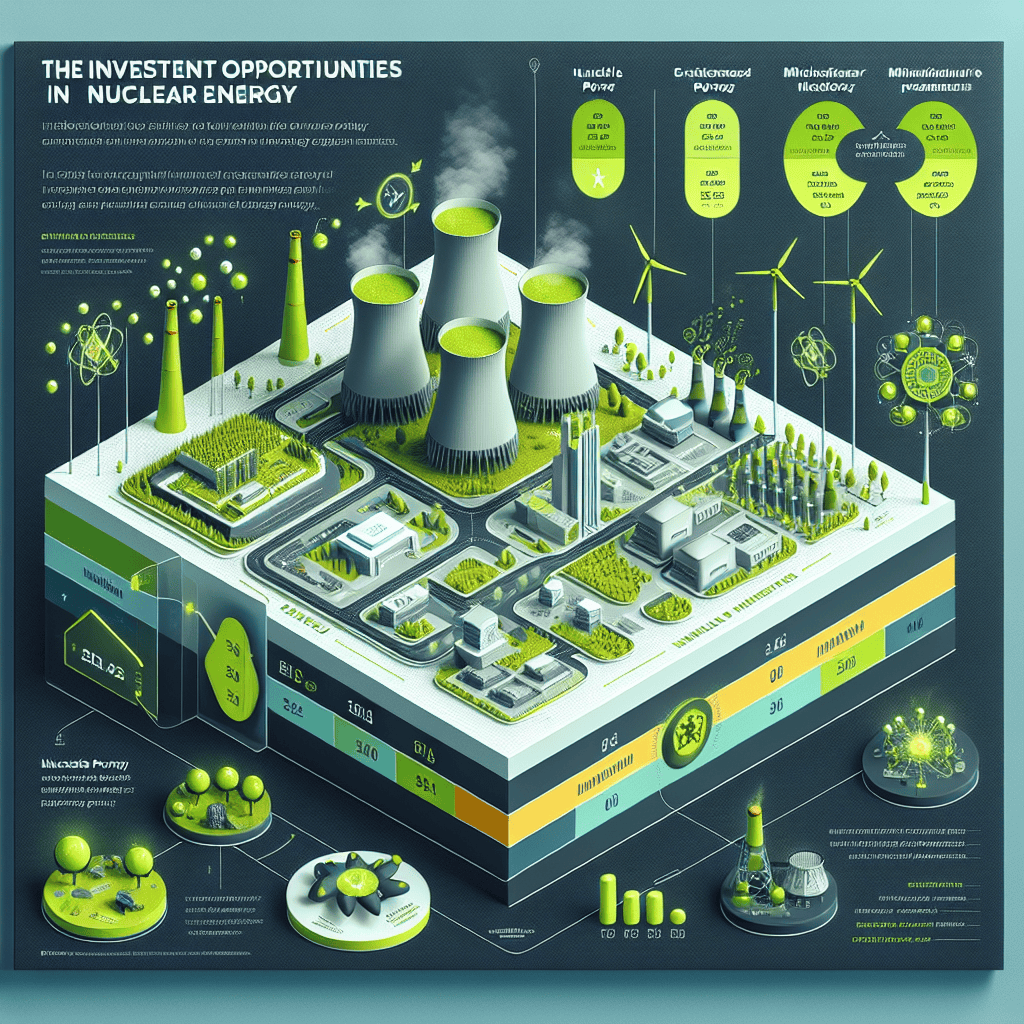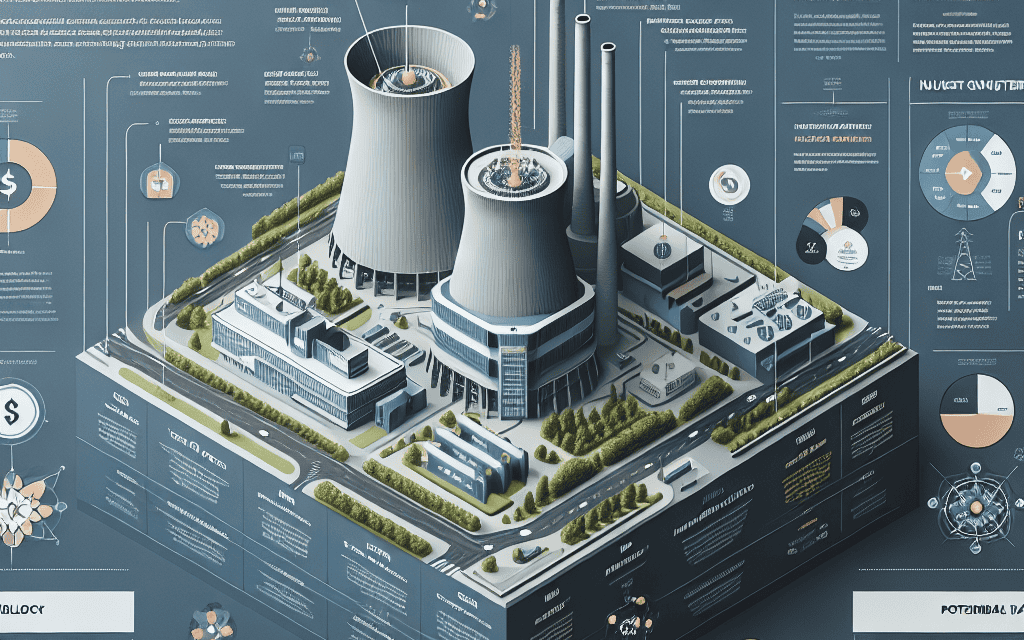“Empowering Your Portfolio with Scalable Nuclear Innovation”
Introduction
NuScale Power is a pioneering company in the field of small modular reactors (SMRs), offering innovative nuclear technology solutions designed to provide scalable and reliable clean energy. As the global demand for sustainable energy sources intensifies, NuScale’s advanced SMR technology presents a compelling investment opportunity. The company’s reactors are designed to be safer, more efficient, and more adaptable than traditional nuclear power plants, making them an attractive option for a diverse range of energy markets. This investment decision guide aims to provide potential investors with a comprehensive overview of NuScale Power’s market position, technological advancements, regulatory environment, and financial prospects, enabling informed decision-making in the rapidly evolving energy sector.
Understanding NuScale Power’s Modular Reactor Technology
NuScale Power, a pioneering company in the field of nuclear energy, has garnered significant attention for its innovative approach to modular reactor technology. As the world increasingly seeks sustainable and reliable energy solutions, understanding the intricacies of NuScale’s technology becomes crucial for potential investors. At the heart of NuScale’s offering is the Small Modular Reactor (SMR), a compact and scalable nuclear reactor designed to address many of the challenges associated with traditional nuclear power plants. Unlike conventional reactors, which are often large and complex, NuScale’s SMRs are designed to be simpler, safer, and more cost-effective.
One of the primary advantages of NuScale’s modular reactors is their scalability. Each module is capable of generating 77 megawatts of electricity, and multiple modules can be combined to meet varying energy demands. This flexibility allows for a tailored approach to energy production, making it possible to add or remove modules as needed. Consequently, this adaptability not only reduces initial capital expenditure but also mitigates financial risk by allowing for incremental investment. Furthermore, the modular nature of these reactors facilitates easier transportation and installation, as they can be manufactured in a factory setting and then transported to the site, reducing construction time and costs.
Safety is another critical aspect where NuScale’s technology stands out. The design incorporates passive safety features that rely on natural physical principles, such as gravity and convection, to ensure the reactor remains safe even in the event of a power outage. This eliminates the need for external power sources or human intervention to maintain safety, significantly reducing the risk of accidents. Additionally, the reactor’s smaller size and underground placement further enhance its safety profile by minimizing the potential impact of external threats, such as natural disasters or human interference.
In terms of environmental impact, NuScale’s SMRs offer a cleaner alternative to fossil fuels. By producing zero greenhouse gas emissions during operation, these reactors contribute to the global effort to combat climate change. Moreover, the efficient use of nuclear fuel and the reduced volume of waste generated by SMRs make them an attractive option for sustainable energy production. This aligns with the growing emphasis on environmental, social, and governance (ESG) criteria among investors, who are increasingly prioritizing companies that demonstrate a commitment to sustainability.
Despite these advantages, potential investors must also consider the challenges associated with NuScale’s technology. Regulatory hurdles remain a significant concern, as nuclear energy is subject to stringent oversight and approval processes. While NuScale has made progress in obtaining necessary certifications, ongoing compliance and potential changes in regulatory frameworks could impact project timelines and costs. Additionally, public perception of nuclear energy continues to be a contentious issue, with concerns about safety and waste disposal persisting in the public discourse.
In conclusion, NuScale Power’s modular reactor technology presents a compelling investment opportunity, offering scalability, safety, and environmental benefits. However, investors must weigh these advantages against the regulatory and perceptual challenges that accompany nuclear energy projects. As the energy landscape evolves, NuScale’s innovative approach positions it as a potential leader in the transition to a more sustainable future. By carefully considering these factors, investors can make informed decisions about their involvement in this promising sector.
Evaluating The Market Potential For NuScale Power
NuScale Power, a company at the forefront of small modular reactor (SMR) technology, presents a compelling opportunity for investors seeking to engage with the evolving energy sector. As the global demand for clean and sustainable energy sources intensifies, the market potential for NuScale Power is increasingly significant. To evaluate this potential, it is essential to consider several key factors, including the technological advantages of SMRs, the regulatory landscape, and the competitive positioning of NuScale Power within the broader energy market.
Firstly, the technological innovation that NuScale Power brings to the table is a critical component of its market potential. SMRs, by design, offer several advantages over traditional nuclear reactors. They are smaller, more flexible, and can be deployed incrementally, which allows for a more adaptable response to fluctuating energy demands. Furthermore, SMRs are designed with enhanced safety features, reducing the risk of catastrophic failures and making them more palatable to a public often wary of nuclear energy. NuScale Power’s SMR technology, in particular, has been recognized for its innovative approach to safety and efficiency, which could position the company as a leader in the nuclear energy renaissance.
In addition to technological considerations, the regulatory environment plays a pivotal role in shaping the market potential for NuScale Power. The nuclear energy sector is heavily regulated, and gaining approval from regulatory bodies is a significant hurdle for any company in this space. However, NuScale Power has made substantial progress in this regard. In 2020, it became the first SMR design to receive approval from the U.S. Nuclear Regulatory Commission, a milestone that underscores its readiness for commercial deployment. This regulatory approval not only validates the safety and viability of NuScale’s technology but also provides a competitive edge in a market where regulatory compliance is paramount.
Moreover, the competitive landscape is another crucial factor to consider when evaluating NuScale Power’s market potential. The energy sector is undergoing a transformation, with a growing emphasis on reducing carbon emissions and transitioning to renewable sources. While solar and wind energy have dominated the conversation, nuclear power remains a vital component of a balanced energy portfolio due to its ability to provide reliable, baseload power without carbon emissions. NuScale Power’s SMRs offer a unique solution that complements intermittent renewable sources, potentially filling a critical gap in the energy market. As countries around the world set ambitious targets for carbon neutrality, the demand for clean, reliable energy solutions is expected to rise, creating a favorable market environment for NuScale Power.
Furthermore, strategic partnerships and collaborations enhance NuScale Power’s market potential. The company has engaged with various stakeholders, including government entities, utilities, and international partners, to advance its technology and expand its market reach. These collaborations not only provide financial support but also facilitate knowledge exchange and market access, which are essential for scaling operations and achieving commercial success.
In conclusion, the market potential for NuScale Power is underpinned by its innovative SMR technology, favorable regulatory positioning, strategic partnerships, and alignment with global energy trends. As the world continues to grapple with the challenges of climate change and energy security, NuScale Power is well-positioned to play a pivotal role in the transition to a sustainable energy future. For investors, this presents an opportunity to engage with a company that is not only at the cutting edge of nuclear technology but also poised to capitalize on the growing demand for clean energy solutions.
Analyzing The Financial Health Of NuScale Power
NuScale Power, a company at the forefront of small modular reactor (SMR) technology, has garnered significant attention from investors seeking opportunities in the clean energy sector. As with any investment, a thorough analysis of the company’s financial health is crucial to making an informed decision. To begin with, understanding NuScale Power’s revenue streams and growth potential is essential. The company primarily generates revenue through the development and deployment of its SMR technology, which promises to offer a safer, more efficient, and cost-effective alternative to traditional nuclear power plants. This innovative approach has attracted interest from both government and private sectors, potentially leading to lucrative contracts and partnerships.
In addition to revenue potential, examining NuScale Power’s financial statements provides insight into its current financial position. The balance sheet reveals the company’s assets, liabilities, and equity, offering a snapshot of its financial stability. A healthy balance sheet typically indicates a strong foundation for growth, while excessive liabilities may signal potential risks. Furthermore, the income statement sheds light on the company’s profitability by detailing its revenues, expenses, and net income over a specific period. A consistent increase in net income suggests effective management and operational efficiency, which are positive indicators for investors.
Moreover, cash flow analysis is a critical component of assessing NuScale Power’s financial health. The cash flow statement highlights the company’s ability to generate cash from its operations, which is vital for sustaining business activities and funding future growth. Positive cash flow from operations indicates that the company can cover its expenses and reinvest in its technology without relying heavily on external financing. Conversely, negative cash flow may raise concerns about the company’s ability to maintain its operations and meet financial obligations.
Another important aspect to consider is NuScale Power’s funding and capital structure. The company has secured significant investments from various sources, including government grants, private equity, and strategic partnerships. These investments not only provide the necessary capital for research and development but also demonstrate confidence in the company’s technology and business model. However, it is crucial to evaluate the terms of these investments and their impact on the company’s financial health. For instance, high levels of debt may increase financial risk, while equity financing could dilute existing shareholders’ ownership.
Furthermore, assessing NuScale Power’s competitive position within the energy sector is vital for understanding its long-term prospects. The company operates in a highly competitive environment, with numerous players vying for market share in the burgeoning SMR industry. Analyzing NuScale Power’s competitive advantages, such as its proprietary technology, strategic partnerships, and regulatory approvals, can provide insight into its ability to maintain and expand its market presence. Additionally, keeping an eye on industry trends and potential regulatory changes is essential, as these factors can significantly impact the company’s growth trajectory.
In conclusion, evaluating the financial health of NuScale Power involves a comprehensive analysis of its revenue streams, financial statements, cash flow, funding structure, and competitive position. By carefully considering these factors, investors can make informed decisions about the potential risks and rewards associated with investing in this innovative company. As the demand for clean energy solutions continues to rise, NuScale Power’s unique approach to nuclear energy positions it as a promising player in the industry, offering potential opportunities for those willing to navigate the complexities of this dynamic market.
Assessing The Regulatory Landscape For NuScale Power

In evaluating the investment potential of NuScale Power, a key consideration is the regulatory landscape that governs the nuclear energy sector. Understanding this framework is crucial for investors, as it directly impacts the company’s operational capabilities and future growth prospects. The nuclear energy industry is one of the most heavily regulated sectors globally, with stringent requirements designed to ensure safety, environmental protection, and public health. Consequently, the regulatory environment can significantly influence the pace at which NuScale Power can expand its operations and bring its innovative small modular reactors (SMRs) to market.
To begin with, the Nuclear Regulatory Commission (NRC) in the United States plays a pivotal role in overseeing the development and deployment of nuclear technologies. NuScale Power’s SMR design has already achieved a significant milestone by receiving design approval from the NRC in 2020. This approval marked a historic moment, as it was the first SMR design to be certified by the NRC, setting a precedent for future SMR technologies. This regulatory endorsement not only validates the safety and efficacy of NuScale’s design but also positions the company favorably within the nuclear energy sector. However, it is important to note that while design approval is a critical step, it is not the final regulatory hurdle. NuScale must still obtain site-specific licenses for each deployment, which involves additional scrutiny and compliance with local regulations.
Moreover, the global regulatory landscape is equally important for NuScale Power, as the company aims to expand its footprint beyond the United States. Different countries have varying regulatory requirements and timelines, which can either facilitate or hinder international expansion. For instance, countries like Canada and the United Kingdom have shown interest in SMR technology and are working towards establishing regulatory frameworks that accommodate these advanced reactors. This international interest presents a promising opportunity for NuScale, but it also necessitates a thorough understanding of each country’s regulatory processes and potential challenges.
In addition to national regulations, international standards set by organizations such as the International Atomic Energy Agency (IAEA) also play a role in shaping the regulatory environment. These standards provide guidelines for safety, security, and environmental protection, which member countries often incorporate into their national regulations. Compliance with these international standards can enhance NuScale’s credibility and facilitate smoother entry into foreign markets.
Furthermore, the evolving nature of energy policies, driven by the global push towards decarbonization, is another factor influencing the regulatory landscape. Governments worldwide are increasingly recognizing the role of nuclear energy in achieving carbon reduction goals, which could lead to more favorable regulatory conditions for nuclear technologies, including SMRs. This shift towards cleaner energy sources may result in streamlined regulatory processes and increased government support for companies like NuScale Power.
In conclusion, while the regulatory landscape presents both challenges and opportunities for NuScale Power, the company’s proactive approach in navigating these complexities is a positive indicator for potential investors. By securing necessary approvals and aligning with international standards, NuScale is well-positioned to capitalize on the growing demand for sustainable energy solutions. However, investors must remain vigilant and informed about ongoing regulatory developments, as these will continue to shape the company’s trajectory in the nuclear energy sector.
Exploring Strategic Partnerships And Collaborations Of NuScale Power
NuScale Power, a prominent player in the field of small modular reactors (SMRs), has been making significant strides in the energy sector through strategic partnerships and collaborations. These alliances are pivotal in advancing their technology, expanding their market reach, and enhancing their competitive edge. As investors consider the potential of NuScale Power, understanding the company’s collaborative efforts provides valuable insights into its strategic direction and growth prospects.
To begin with, NuScale Power’s collaboration with Fluor Corporation, a global engineering and construction firm, has been instrumental in the development and commercialization of its SMR technology. This partnership leverages Fluor’s extensive experience in project management and construction, ensuring that NuScale’s innovative reactors are not only technologically advanced but also feasible from an engineering and economic standpoint. The synergy between NuScale’s cutting-edge technology and Fluor’s execution capabilities underscores the potential for successful deployment of SMRs on a global scale.
Moreover, NuScale has engaged in partnerships with various research institutions and universities, fostering innovation and continuous improvement of its reactor designs. Collaborations with academic entities such as Oregon State University have facilitated research and development efforts, enabling NuScale to refine its technology and address potential challenges. These partnerships are crucial for maintaining a competitive edge in the rapidly evolving nuclear energy landscape, as they provide access to a wealth of knowledge and expertise.
In addition to academic collaborations, NuScale has formed alliances with international entities to explore opportunities in global markets. For instance, the company’s partnership with the Romanian energy company Nuclearelectrica aims to evaluate the deployment of SMRs in Romania. This collaboration not only highlights NuScale’s commitment to expanding its international footprint but also demonstrates the growing interest in SMR technology as a viable solution for clean and reliable energy. By engaging with international partners, NuScale is positioning itself to capitalize on the increasing demand for sustainable energy solutions worldwide.
Furthermore, NuScale’s strategic partnerships extend to supply chain collaborations, which are essential for ensuring the efficient production and deployment of its reactors. By working closely with suppliers and manufacturers, NuScale can streamline its production processes, reduce costs, and enhance the overall quality of its products. These collaborations are vital for scaling up operations and meeting the anticipated demand for SMRs in the coming years.
As NuScale Power continues to forge strategic partnerships and collaborations, it is essential for investors to consider the implications of these alliances on the company’s growth trajectory. The ability to leverage external expertise, access new markets, and optimize production processes positions NuScale favorably in the competitive nuclear energy sector. Moreover, these partnerships reflect a proactive approach to addressing industry challenges and seizing emerging opportunities.
In conclusion, NuScale Power’s strategic partnerships and collaborations are a testament to its commitment to innovation, growth, and sustainability. By aligning with key industry players, research institutions, and international partners, NuScale is well-equipped to navigate the complexities of the nuclear energy landscape and drive the adoption of SMR technology. For investors, these collaborative efforts not only enhance NuScale’s value proposition but also underscore its potential as a leader in the future of clean energy. As the company continues to expand its network of alliances, it remains poised to make significant contributions to the global energy transition.
Comparing NuScale Power With Competitors In The Nuclear Sector
In the rapidly evolving landscape of nuclear energy, NuScale Power has emerged as a notable contender, particularly in the realm of small modular reactors (SMRs). As investors consider the potential of NuScale Power, it is essential to compare its offerings with those of its competitors in the nuclear sector. This comparison not only highlights the unique attributes of NuScale but also provides a broader understanding of the competitive dynamics within the industry.
To begin with, NuScale Power distinguishes itself through its focus on SMR technology, which offers several advantages over traditional nuclear reactors. SMRs are designed to be more flexible, scalable, and cost-effective, making them an attractive option for countries and companies looking to diversify their energy portfolios with lower upfront capital investment. In contrast, many of NuScale’s competitors, such as Westinghouse and EDF, have historically concentrated on large-scale nuclear reactors. While these traditional reactors have proven their efficacy in generating substantial amounts of electricity, they often require significant financial and infrastructural commitments, which can be a barrier for some potential clients.
Moreover, NuScale’s SMR technology is designed with enhanced safety features, a critical consideration in the nuclear sector. The company’s reactors incorporate passive safety systems that rely on natural forces like gravity and convection, reducing the need for human intervention and external power sources in the event of an emergency. This focus on safety is a significant differentiator, especially in a post-Fukushima world where regulatory scrutiny and public perception are paramount. Competitors such as Rosatom and China National Nuclear Corporation (CNNC) are also advancing their SMR technologies, but NuScale’s early entry into the market and its partnerships with entities like the U.S. Department of Energy provide it with a competitive edge.
Transitioning to the economic aspect, NuScale’s business model offers potential cost savings and shorter construction timelines compared to traditional nuclear projects. The modular nature of SMRs allows for factory fabrication and assembly, which can lead to more predictable costs and schedules. This is particularly appealing in an industry where cost overruns and delays are common. While companies like GE Hitachi are also exploring modular designs, NuScale’s progress in securing regulatory approvals and customer commitments places it in a favorable position.
Furthermore, the global push towards decarbonization and sustainable energy solutions presents a significant opportunity for NuScale and its competitors. As countries strive to meet climate goals, nuclear energy is increasingly viewed as a viable option for reducing carbon emissions. NuScale’s SMRs, with their smaller environmental footprint and ability to integrate with renewable energy sources, align well with these global trends. However, it is important to note that competitors are not standing still. Companies like Rolls-Royce and Korea Hydro & Nuclear Power are actively developing their own SMR technologies, aiming to capture a share of this burgeoning market.
In conclusion, while NuScale Power offers a compelling proposition with its innovative SMR technology, investors must consider the broader competitive landscape. The nuclear sector is characterized by rapid technological advancements and shifting regulatory environments, which can impact the prospects of any company. By comparing NuScale with its competitors, investors can make more informed decisions, weighing the potential risks and rewards associated with this dynamic industry. As the world continues to seek reliable and sustainable energy solutions, the role of companies like NuScale Power will undoubtedly be pivotal in shaping the future of nuclear energy.
Identifying Risks And Opportunities In Investing In NuScale Power
Investing in NuScale Power, a company at the forefront of small modular reactor (SMR) technology, presents a unique blend of risks and opportunities that potential investors must carefully evaluate. As the global energy landscape shifts towards sustainable and low-carbon solutions, NuScale Power’s innovative approach to nuclear energy positions it as a potentially lucrative investment. However, like any investment, it is crucial to weigh the potential rewards against the inherent risks.
One of the primary opportunities in investing in NuScale Power lies in the growing demand for clean energy. As countries worldwide commit to reducing carbon emissions, the need for reliable and sustainable energy sources has never been more pressing. NuScale’s SMR technology offers a promising solution by providing a scalable and efficient alternative to traditional nuclear power plants. These reactors are designed to be safer, more cost-effective, and quicker to deploy, making them an attractive option for governments and utilities seeking to transition away from fossil fuels. Consequently, the potential market for SMRs is vast, and NuScale Power is well-positioned to capitalize on this trend.
Moreover, NuScale Power has garnered significant support from both the public and private sectors, further enhancing its investment appeal. The company has received substantial funding from the U.S. Department of Energy, which underscores the government’s confidence in its technology. Additionally, partnerships with major industry players and international agreements to deploy SMRs in various countries highlight the growing interest and trust in NuScale’s capabilities. These collaborations not only provide financial backing but also facilitate the company’s expansion into new markets, thereby increasing its growth potential.
However, despite these promising opportunities, investing in NuScale Power is not without its risks. One of the most significant challenges facing the company is the regulatory environment. Nuclear energy is subject to stringent regulations, and obtaining the necessary approvals for new technologies can be a lengthy and complex process. Any delays or setbacks in securing regulatory clearance could impact NuScale’s ability to bring its products to market, potentially affecting its financial performance and investor returns.
In addition to regulatory hurdles, NuScale Power must also contend with competition from other clean energy technologies. While SMRs offer distinct advantages, they are not the only solution to the world’s energy challenges. Renewable energy sources such as wind, solar, and hydropower continue to gain traction, driven by technological advancements and decreasing costs. As a result, NuScale must demonstrate the unique value proposition of its SMRs to secure a competitive edge in the evolving energy landscape.
Furthermore, the financial viability of NuScale Power’s projects is another critical consideration for investors. The initial costs associated with developing and deploying SMRs can be substantial, and the company must ensure that its projects are economically feasible. This requires careful management of construction timelines, budgets, and operational efficiencies to deliver on its promises of cost-effectiveness and scalability.
In conclusion, investing in NuScale Power offers a compelling opportunity to participate in the transition to a sustainable energy future. The company’s innovative SMR technology, coupled with strong governmental and industry support, positions it as a potential leader in the nuclear energy sector. However, investors must remain vigilant to the risks associated with regulatory challenges, competitive pressures, and financial execution. By carefully assessing these factors, investors can make informed decisions about the potential rewards and pitfalls of investing in NuScale Power.
Q&A
1. **What is NuScale Power?**
NuScale Power is a company that designs and markets small modular reactors (SMRs) for nuclear power generation, offering a scalable and flexible approach to nuclear energy.
2. **What are the advantages of investing in NuScale Power?**
Advantages include innovative technology in the nuclear sector, potential for growth in clean energy markets, and strategic partnerships with government and private entities.
3. **What are the risks associated with investing in NuScale Power?**
Risks include regulatory challenges, high initial capital costs, competition from other energy sources, and potential delays in project deployment.
4. **What is the current financial status of NuScale Power?**
As of the latest reports, NuScale Power has been securing funding through partnerships and government grants, but investors should review the most recent financial statements for detailed insights.
5. **Who are the key partners and stakeholders in NuScale Power?**
Key partners include Fluor Corporation, the U.S. Department of Energy, and various utility companies interested in deploying SMR technology.
6. **What is the market potential for NuScale Power’s technology?**
The market potential is significant, especially in regions seeking to reduce carbon emissions and transition to cleaner energy sources, with interest from both domestic and international markets.
7. **What are the future prospects for NuScale Power?**
Future prospects depend on successful commercialization of their SMR technology, expansion into new markets, and continued support from regulatory bodies and investors.
Conclusion
NuScale Power, a company specializing in the development of small modular reactors (SMRs), presents a unique investment opportunity in the evolving energy sector. The company’s technology offers potential advantages such as enhanced safety features, scalability, and reduced construction times compared to traditional nuclear power plants. As global demand for clean and reliable energy sources increases, NuScale’s SMRs could play a significant role in the transition to low-carbon energy systems. However, investors should consider the regulatory challenges, high initial capital costs, and competition from other renewable energy technologies. Additionally, the company’s financial health, strategic partnerships, and progress in securing contracts will be critical factors influencing its long-term success. Overall, while NuScale Power holds promise, potential investors should conduct thorough due diligence and weigh the risks and rewards before making an investment decision.





